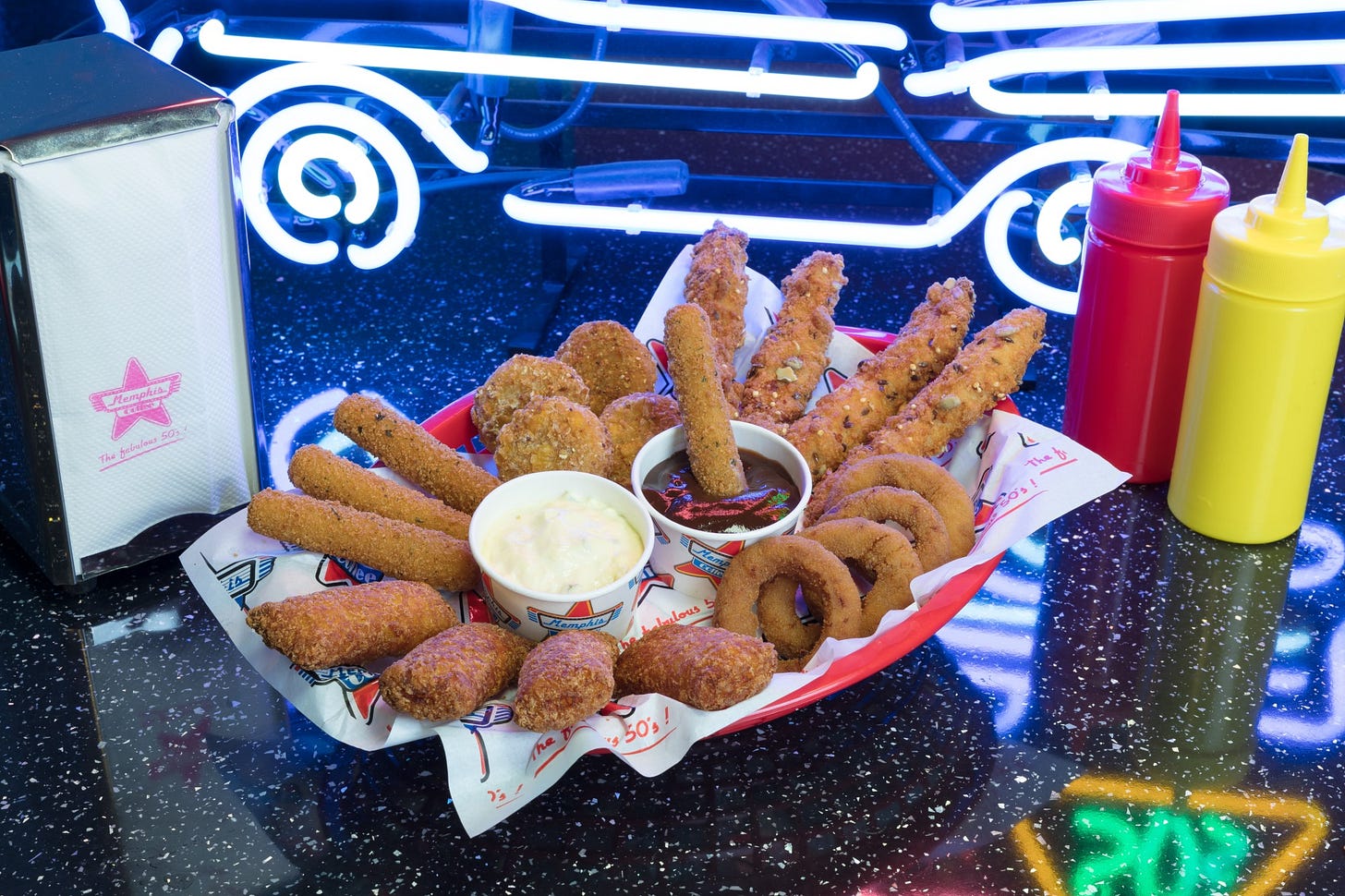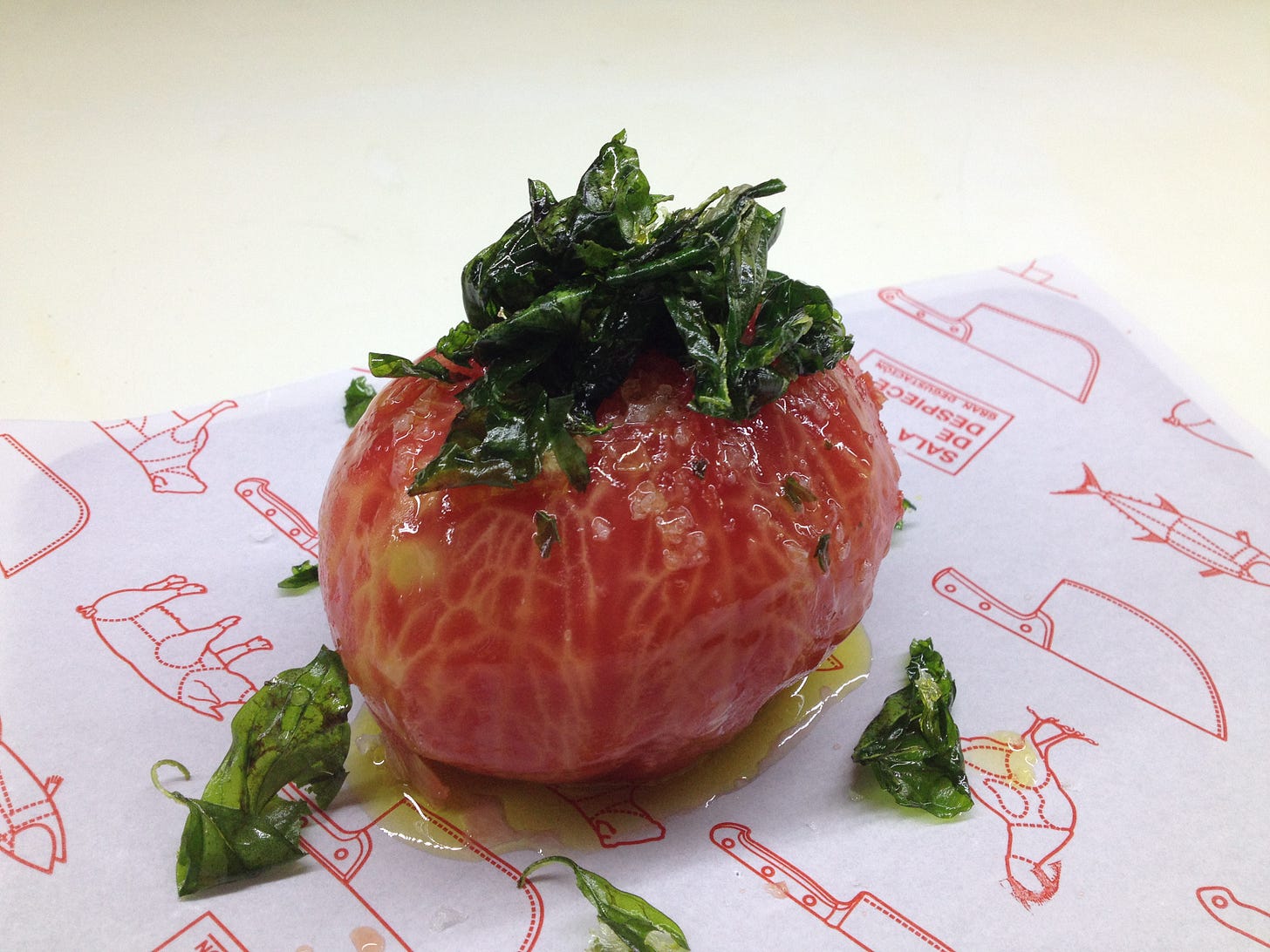If you enjoy the newsletter today, please forward it to someone who’d enjoy it, and tap the heart icon above, which will help me reach more readers. I appreciate your help, y’all!
Speaking of hearts! There’s a Valentine’s sale on Smart Mouth swag right now. Order here.
Tracing the West African Diaspora with Ozoz Sokoh
West Africa’s influence on global cuisine: it’s there if you look for it.
Listen to Smart Mouth: iTunes • Google Podcasts • Stitcher • Spotify • RadioPublic • TuneIn • Libsyn
The French Love Bad Bagels
By Ciara McLaren
At a suburban shopping center outside Pau, France, there is a life-size statue of Michael Jordan wearing the number 32. (This was not his number.) It sits in front of a restaurant serving something called a “Sloopy Joe.”
That restaurant is called Memphis Coffee. It is very popular.
Memphis Coffee is just one of several American-themed restaurant chains operated in France, with French owners. Buffalo Grill, a Wild West take on American cuisine, is the most popular sit-down restaurant in the country.
In a place renowned for its cuisine, why do so many people frequent imitation American restaurants?
According to Abigail, a student from the Loiret region of France, cuisine isn’t really the point. On trips to Memphis Coffee, Abigail found the food barely memorable — “mainly burgers and bagels if I remember correctly” — if mediocre: “the fries were obviously from the freezer.”
The real draw is the setting: a cartoon version of America. “It seems to me like they want to recreate a stereotypical and romanticized version of what it is like,” says Abigail. “What French people imagine when thinking of an American diner, all the while knowing that this representation is exaggerated.” The novelty, and low prices, attracted Abigail and her friends.
For Americans, walking into a cartoon version of their country is a very different experience. “It was really strange,” says Megan, who is from Memphis. “It felt like a mix of multiple decades of a diner,” with ancient license plates on the walls, a jukebox in the corner, and modern table settings. To French people, it is all simply American. To Americans, it is a bizarre mishmash.
The same pattern applies to the food. Memphis Coffee serves something called “American Eggs:” poached eggs over potato patties garnished with julienned ham, covered in Emmental, and served with a choice of side salad, green beans, or “American rice.”
What is so American about the American eggs? It’s unclear. But the differences that don’t faze French people (green beans? With eggs?) are marked to Americans.
At times, the differences are not just bemusing, but harmful. During a trip to Buffalo Grill, Heather, who is from Northern Virginia, was “horrified” to see a mounted faux head of a Native American. “It was like a hunting trophy,” she says.
Char Kol, a pop-up Korean barbecue restaurant run by white Americans, prompted protests earlier this year as it became clear the owners didn’t know anything about Korea.
When asked what a restaurant with the roles reversed would be like (a Paris cafe-themed chain in the strip malls of America, for instance) Abigail mused on the decor — “pictures of Paris streets, the Tour Eiffel and so on” — and the music — “old-timey singers such as Edith Piaf or Jacques Brel” — before landing on the food.
“They'd have to strike a balance between the well-known dishes and what American people would actually like to eat. I know that, for example, snails can be off-putting.” 🥯
Consider signing up for a paid subscription. The money goes toward paying our contributors around the world and, starting in March, an extra edition every month. (If you like, you can choose any amount over $5 in the “supporter subscription plan” field.)
*If you would like to give less than $5, you can do that via Patreon, and it is very helpful and appreciated! You can give just $1/month, and you’ll get podcast episodes a week early.
The Best Tomato in Madrid
Located on Calle de Ponzano, a Madrid street so known for its gastronomy that it has its own hashtag (#ponzaning), Javier Bonet’s Sala de Despiece began as a one-location eatery with no reservations and a constant queue down the block. Bonet’s menu is rooted in the concept of cocina del mercado (cooking that uses only the freshest market ingredients) and is chock-full of dishes you’re unlikely to find anywhere else. One of them is his famed “Solomillo de Tomata” — the first item on the menu and an absolute must. Peeled by hand and infused with a homemade brine of fresh tomato, sugar, and basil, it’s served drizzled with extra-virgin olive oil and topped with sea salt and flash-fried basil. Juicy, piquant, and velvety, this tomato alone is worth the queue — but this year, fear not. If 2020 were to be acknowledged for anything, it’d be for the end of the lineup: Sala de Despiece now takes reservations. So go over to its website, reserve a table like your next mind-blowing dining experience depended on it, and make sure to start with the tomato. —Margarita Gokun Silver
Ponzano 10, 11, and 13, 28010, Madrid, Spain. saladedespiece.
From the Smart Mouth archives:
If you’re buying chocolate this week (Valentine’s Day is the excuse, not the actual reason), buy from one of these companies.
But also, if you’d like to talk about why the chocolate industry is evil, head right this way.
This newsletter is edited by Katherine Spiers, host of the podcast Smart Mouth.
A TableCakes Production.
Want to contribute? Here are the submission guidelines.







